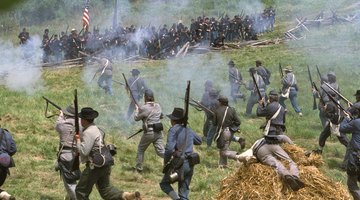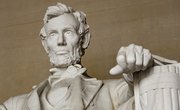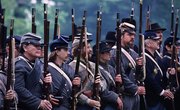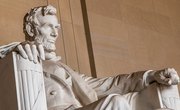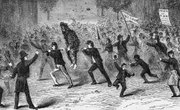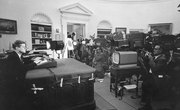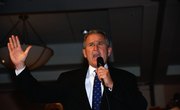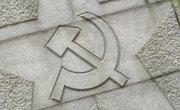Shortly after Abraham Lincoln was elected president in 1860, a series of Southern states seceded from the Union, beginning with South Carolina. Though the Civil War had not yet started, Lincoln and the U.S. government took a series of steps both to avoid the outbreak of war and, later, to end it. These included policies on the illegality of secession and strategic military tactics.
Reiteration of Lincoln's Slavery Position
Abraham Lincoln had promised while campaigning that he would not interfere with slavery in states where it was legal, but Southern states began seceding from the Union out of fear that he and the Republicans were intent on banning slavery throughout the country. Hoping to appease the newly declared Confederate states, Lincoln reaffirmed his position, and even agreed to a proposed 13th amendment to the Constitution that would have guaranteed tolerance of slavery in the states where it existed. The amendment did not pass.
Commitment to Nonviolence
Lincoln and other Republicans viewed secession as illegal, and refused to acknowledge its legality. As such, when Lincoln was inaugurated, he vowed to continue to operate federal properties in the South that were still held by federal forces. In addition, he refused to use violence to compel the South to rejoin the Union, hoping to find peaceful reconciliation. These two policies worked in tandem, however, to force the South to be the aggressor. Lincoln announced that he would defend any further incursions on federal property, and when Confederate forces attacked Fort Sumter in April 1861, they fired the first shots of the war.
Economic Blockade
Once Fort Sumter had been attacked and war began, the U.S. government began considering military tactics to end the war, with a blockade of Southern ports being a top priority. The blockade had two objectives: first to limit the Confederacy's ability to obtain weapons, and second to hurt the South's economy by impairing its cotton exports. The blockade, however, was often porous, because the South's 2,500-mile coastline was difficult to patrol with an initial Union fleet of only about 40 ships.
Defeat the South on its Own Turf
With full-blown warfare underway, the U.S. government's strategy aimed at an invasion of the South. Many Americans expected the invasion would be quick and would compel the Confederacy to ends its illegal secession. This, however, quickly became unfeasible after the First Battle of Bull Run in July 1861, when Union forces were forced to retreat to Washington, D.C. Lincoln then enacted a policy of total warfare, and requested 500,000 more recruits to create an army to invade the South.
Related Articles
References
Writer Bio
Kevin Wandrei has written extensively on higher education. His work has been published with Kaplan, Textbooks.com, and Shmoop, Inc., among others. He is currently pursuing a Master of Public Administration at Cornell University.

